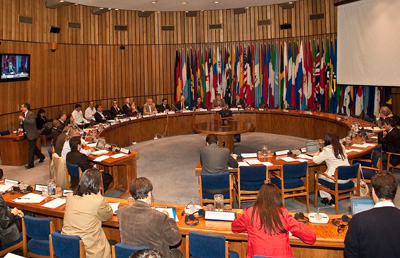Poverty Among the Rural Population in the Region Increases their Vulnerability to Climate Change
Experts stress the need for adaptation and mitigation measures for agriculture in Latin America and the Caribbean.

(10 November 2010) Currently over 50% of the rural population in Latin America and the Caribbean is poor and almost a third lives in conditions of extreme poverty. They are particularly vulnerable to the effects of climate change on agriculture, warned experts during a seminar at ECLAC headquarters in Santiago, Chile.
The areas most adversely affected by this phenomenon are tropical and subtropical regions, where most developing countries dependent on agriculture are located. That is why public policies urgently need to include adaptation and mitigation measures to climate change, stated specialists during the regional seminar Agriculture and Climate Change: Innovation, Policies and Institutions.
The meeting is being held from 10-12 November and is organized by the Economic Commission for Latin America and the Caribbean (ECLAC), the Regional Office of the UN Food and Agriculture Organization (FAO) and the Inter American Institute of Cooperation for Agriculture (IICA), with the support of the Government of France.
It was inaugurated by the Deputy Executive Secretary of ECLAC, Antonio Prado, who said that although agriculture is one of the economic sectors in the region most affected by climate change, public policies have not taken on the issue appropriately.
"The issue of climate change has received little attention in the public policy agenda of the agriculture and livestock sector. It has been relegated to a relatively ‘lateral' position, even in countries that have significant agricultural policy instruments," he stated.
However, Prado acknowledged that important progress has been made recently with the creation of sectoral commissions on agriculture and technical diagnoses and scientific research on the issue. In addition, regional and subregional initiatives are coordinating the efforts of ministries or secretaries of agriculture, environment and health in the region.
Alan Bojanic, Deputy Regional Representative for Latin America and the Caribbean of the FAO, said that talking about development today is impossible without considering the issue of climate change adaptation, especially because of its ties to global food security.
"Perhaps no other sector has the same potential as agriculture to directly help address climate change. The only thing not allowed is lack of action to suggest measures that may contribute to mitigate its effects and adapt agriculture to climate change," stressed Bojanic.
James French, Director of Technical Cooperation at IICA, said that climate change is the biggest challenge humanity must face over the next 30-40 years. Its impact on the agriculture of the future will be particularly significant, "with the implications that has on rural and urban development, food security and illnesses".
"We need more investment at a governmental and international level for scientific research and developing countries' institutional frameworks so we can better manage this problem as a global society," he stated.
Lastly, Maryse Bossière, Ambassador of France in Chile, noted that the union of several consecutive crises - food, climate and financial, among others - has aggravated the impact each one may have individually on humanity and especially on developing regions.
"The food crisis is probably the most serious one. That's why the agricultural sector plays a strategic role, not only due to its primary function of producing food, but also because it provides economic and environmental resources in rural areas, where particularly impoverished populations vulnerable to the different crises, survive," she said.
See also:
- Words by Antonio Prado, ECLAC's Deputy Executive Secretary (in Spanish)
- Programme of the seminar (in Spanish)
The media is welcome to attend the seminar being held in the Celso Furtado conference room at ECLAC headquarters in Santiago, Chile (Av. Dag Hammarskjöld 3477, Vitacura). The seminar is broadcast live via webcast at: mms://media.eclac.cl/SalaFurtado.
For inquiries, please contact ECLAC's Public Information and Web Services Section. Email: dpisantiago@cepal.org; telephone: (56-2) 210-2040.
Related content
Seminario Agricultura y Cambio Climático
Por Antonio Prado, Secretario Ejecutivo Adjunto de la CEPAL
Experts to Assess Effects of Climate Change on Agriculture in the Region
The phenomenon impacts the rural population of Latin America and the Caribbean, most of which lives in conditions of poverty.
Country(ies)
- Latin America and the Caribbean